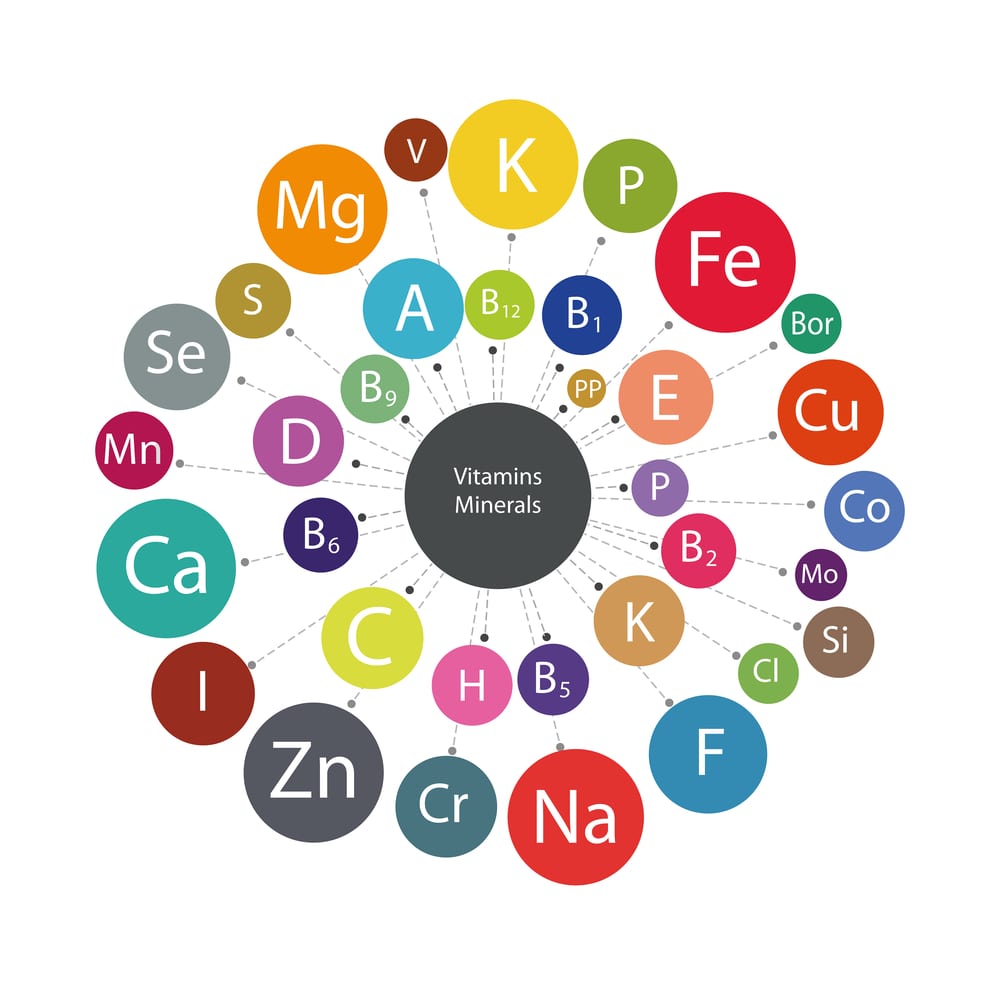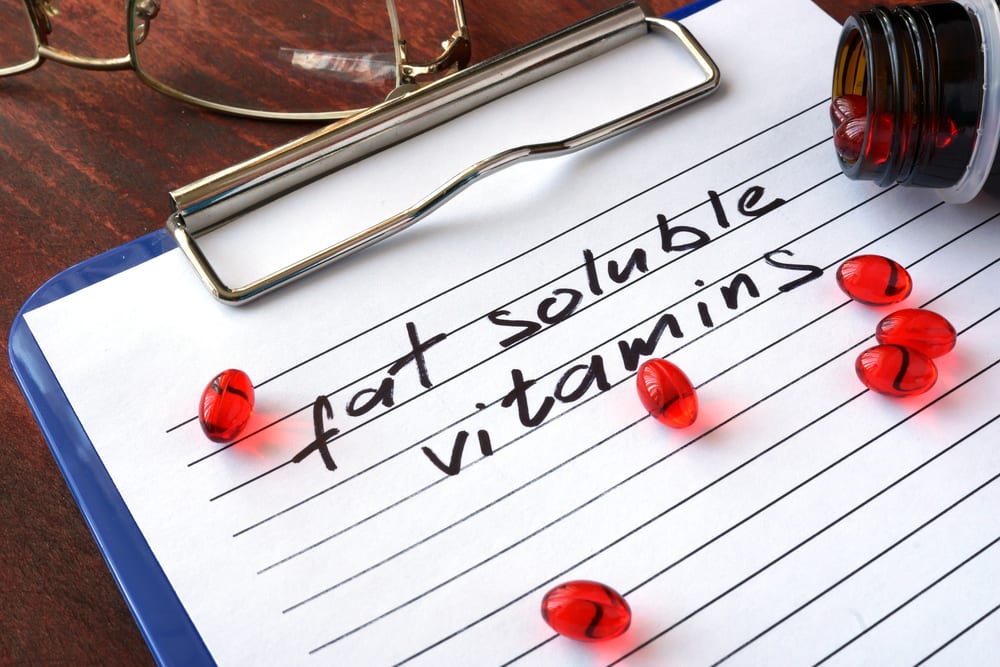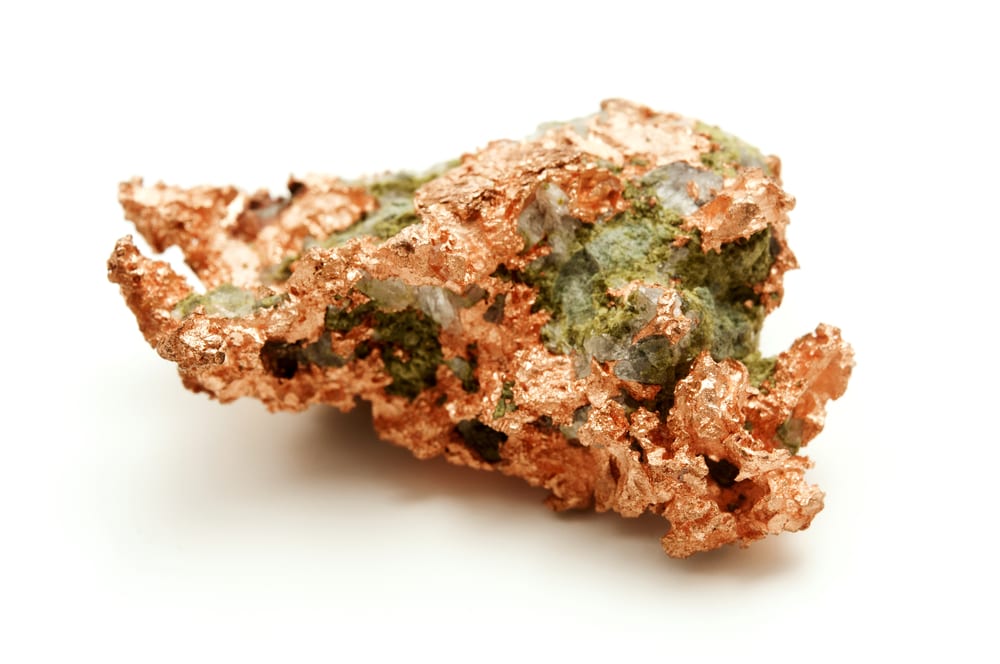
Vitamins and minerals are types of nutrients. Specifically, they are micronutrients. In comparison, the macronutrients are carbohydrates, proteins, and fats. Below, we look at vitamins and minerals, talk about their differences, and explain why you need them.
Vitamins
Vitamins are organic compounds that are necessary for proper human health. In general, your human body can’t control many processes and functions without them. Since the human body can’t produce vitamins (except for D and K), we must get them from outside sources. The two main sources of vitamins are the foods we eat and dietary supplements (1).
13 Essential Vitamins
There are 13 essential vitamins — vitamins A, C, D, E, K along with all the B vitamins: B1 (thiamine), B2 (riboflavin), B3 (niacin), B5 (pantothenic acid), B6 (pyroxidine), B7 (biotin), B9 (folate), and B12 (cobalamin) (2). The average person who eats a balanced diet gets all of these vitamins from foods. Additionally, the human body can create vitamin D (from sunshine) and vitamin K (created by bacteria in the large intestine) (3).

Two Types of Vitamins
There are two main categories of vitamins: fat-soluble and water-soluble. The body stores and transports the four fat-soluble vitamins (A, D, E, and K) through fatty tissues. Since the body stores these vitamins in fat, be cautious when taking fat-soluble vitamins. Specifically, taking too much of these vitamins could be harmful.
The other category of vitamins is water-soluble. This group includes the other nine essential vitamins (C along with all the B vitamins). Since these vitamins dissolve in water and the body continually removes them in your urine, your body constantly needs fresh doses of these vitamins (4).
Minerals
Like vitamins, minerals also help your body to function normally. However, without the proper amounts of minerals, your health suffers. Minerals help you maintain strong bones, a healthy heart, and proper nervous system functioning. But they are also important building blocks for certain hormones and enzymes (5). Also, like vitamins, the human body cannot produce minerals. Consequently, they must be introduced into the body either through the diet or dietary supplements.
Two Types of Minerals
There are two types of minerals: macrominerals and trace minerals. Yet both types are necessary for good health. However, your body simply needs them in different amounts. As the name suggests, the body needs greater doses of macrominerals. Some of these include calcium, magnesium, sodium, and potassium. On the other hand, the body only needs small doses of trace minerals like iron, copper, iodine, zinc, and selenium (5). However, even though the body needs smaller amounts of trace elements, they are still necessary for good health.
Common Mineral Supplements
Below are a few some common mineral supplements along with the ways they help the body (6):
- Calcium — Necessary for strong bones, muscle growth, heart health, digestive system health, and the creation and maintenance of blood cells
- Iron — An important building block for many proteins and enzymes, most notably hemoglobin
- Magnesium — Necessary for bone health and processing ATP
- Chromium — Assists with glucose and lipid metabolism
- Potassium — A necessary electrolyte

What’s The Difference Between Vitamins And Minerals?
Although your body needs both vitamins and minerals to function properly, there are differences between them. Overall, the big difference is what they’re made of. Vitamins are organic, complex molecules or compounds composed of different elements. For example, vitamin D is composed of the elements carbon, hydrogen, and oxygen (7). Vitamin A is also made of the same three elements but in a different configuration (8).
In comparison, minerals are elements found on the periodic table (9). For example, calcium (atomic number 20) is an alkaline earth metal and an element the body needs for strong bones (10). Moreover, iron, which helps prevent anemia, is also a metal and is atomic number 26 (11). And copper, a soft metal with atomic number 29, is useful for building many enzymes (12).
What Are The Most Important Ones To Keep Nourished?
By staying well-nourished and eating a balanced diet, the average person gets all the vitamins and minerals they need. However, which are the most important ones to help a person stay nourished?
As the name says, the 13 essential vitamins are necessary for good health. What’s more, your body needs all the major minerals (calcium, chloride, magnesium, phosphorus, potassium, sodium, and sulfur) as well as the trace minerals (chromium, copper, fluoride, iodine, iron, manganese, molybdenum, selenium, and zinc) (14). In summary, each person should get adequate amounts of all of these vitamins and minerals.
Let SMP Make Your Vitamins and Minerals
SMP Nutra is a full-service, turnkey producer of vitamins and minerals. From softgels to gummies, we manufacture all of our products in-house at our FDA-approved, next-gen facility. Whether you’re new to the industry, are adding a new product line, or want a new source, SMP Nutra is ready to help. Contact us today to learn more about our manufacturing process.
References:
- https://www.uen.org/lessonplan/view/1261
- https://www.disabled-world.com/medical/supplements/vitamins/
- http://www.vivo.colostate.edu/hbooks/pathphys/topics/vitamink.html
- https://www.uen.org/lessonplan/view/1261
- https://medlineplus.gov/minerals.html
- https://en.wikipedia.org/wiki/Mineral_(nutrient)#Elements_considered_possibly_essential_but_not_confirmed
- https://pubchem.ncbi.nlm.nih.gov/compound/ascorbic_acid
- https://pubchem.ncbi.nlm.nih.gov/compound/445354
- https://en.wikipedia.org/wiki/Mineral_(nutrient)
- https://en.wikipedia.org/wiki/Calcium
- https://en.wikipedia.org/wiki/Iron
- https://en.wikipedia.org/wiki/Copper
- https://www.betternutrition.com/features-dept/vitamin-deficiencies
- https://www.helpguide.org/harvard/vitamins-and-minerals.htm

